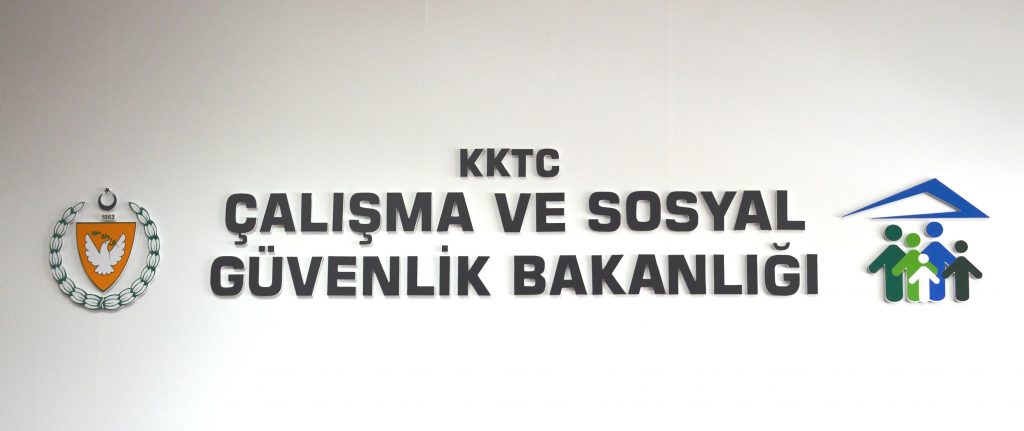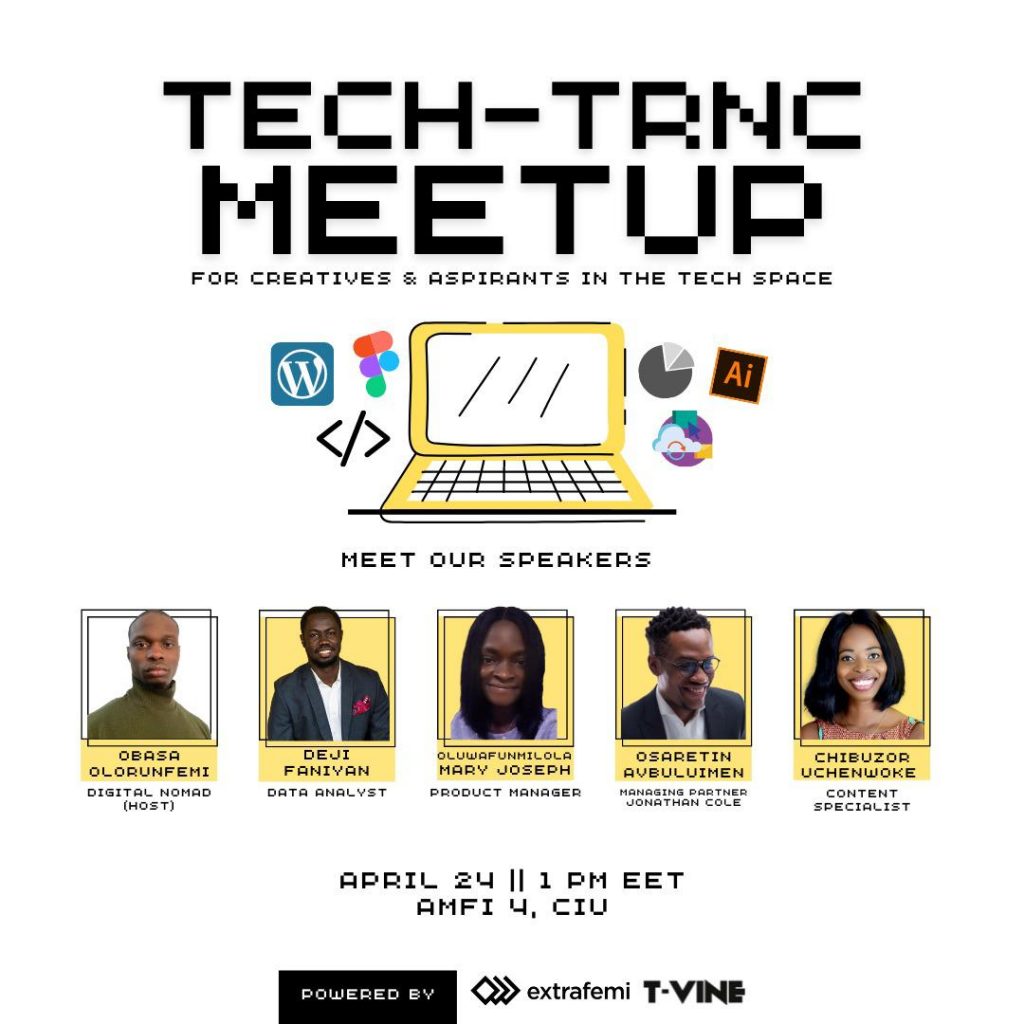In spite of the prevailing challenges for the TRNC’s economy, international students in North Cyprus are teaming up to form “TECH-TRNC”.
Believed to be the first tech community in North Cyprus, this new TRNC Tech Meet-Up Group aims to create awareness among university students of the evolving possibilities in the tech world, and to position themselves ready to leverage the growing employment and business opportunities that exist.
International students in North Cyprus are not the only ones to spot these opportunities. Similar communities also exist in Nigeria, the US, and Canada to mention a few. These tech hubs bring together highly skilled local talent, while attracting foreign investment to the local start-up scene.
Many governments around the world have also recognised these possibilities and initiated policies favourable for citizens and foreign residents alike.
Some examples of such policies are the “One Million Arab Coders” project in the UAE, whose primary goal was met in February 2021 with 1.2 million enrolments from Arabs around the world to learn new coding skills.
There is also CcHub Nigeria, Google Canada, the Tech Nation Visa in the UK that offer similar initiatives, while Saudi Arabia’s partnership with Nigeria aims to provide Nigerian entrepreneurs with expedited entry and support via the Digital Cooperation Organization (DCO) Start-up Passport, also known as “the Startup Passport initiative”.
There are also Nomad visas. This visa and resident option was created to meet the demands of nomad entrepreneurs and remote workers who operate virtually around the world. It alleviates the need for such people to register their business with a physical local address, or to apply as students, or to obtain tourist visas to bypass restrictions, or to cough up ludicrous sums for business and residency permits in a country where they want to operate.
This nomad visa is now offered by and available in at least 40 countries globally, with more set to rubber stamp the scheme later in the year.
What opportunities exist in the technology space for international students?
According to LinkedIn, 7 of the top 10 hard skills needed the most by companies in 2020 were tech-related (see infographic below).
Also, according to RS in the UK (see infographic), the most in-demand tech skill in 2022 is software development, followed closely by Javascript. Little wonder the UK government created the “Tech Nation Visa” for exceptionally talented tech professionals who intend to move to the UK and contribute to the growing digital technology sector.
From a broader North Cyprus perspective, technology could play a key role beyond driving growth within the international student community, which accounts for a quarter of the local population, and helps generate 20% of the GDP (as of 2019). It can help the local community to develop, and possibly positively impact the Cyprus problem too.
In short, “TECH-TRNC” could serve as a pilot of what a tech community could look like and contribute to the TRNC economy. There are over a dozen universities in North Cyprus, whose courses involve the use or study of technology, and over 100,000 higher education students.
The environment is ripe for the TRNC to become a leading tech hub in the Eastern Mediterranean.
The roots of TECH-TRNC
In this light, it is also important to share the steps that led to the formation of “Tech-TRNC”. Informed by research and powered by Extrafemi and partnerships from Nigeria, the foundational blocks were laid.
Here is a summary of those initial steps and efforts from 2019 to date, that paved the way to formally launch Tech-TRNC:
- In Feb 2019, even before arriving in the TRNC and later in October 2019, we live-streamed a session from the prestigious Social Media Week (SMW) Lagos, where we partnered with the largest phone brand in Nigeria to the TRNC and taught mobile photography for free.
- In May 2020, during the pandemic, we partnered with Wakafire Photography to host the “Monetize by Extrafemi” event, where together with speakers from other countries, we discussed emerging industries and tech, including the importance of cryptocurrency. Participants attended virtually from four countries, including the TRNC.
- In August 2020, we curated a collection of videos through which anyone can earn money online. All rights and credit go to the video creators.
- Still in August 2020, we went further to partner with Dbrown Consulting, Wakafire photography, HNG internship, and more to bring about free courses on Excel, mobile photography, coding, and more to the international student community.
- In October 2020, we partnered with T-VINE Magazine in the United Kingdom to create a platform for anyone, especially international students who wanted to share stories/ articles, particularly because positive stories about the International student community were rare in the mainstream news. This effort also birthed the ‘celebrating diversity in the TRNC’ series.
- During the summer of 2021, we partnered with the Cyprus International University Christian Fellowship (CIUCF) to share opportunities in tech via a virtual event. This event snowballed into another call for those interested to take advantage of the AltSchool Africa offer to get into either frontend, backend, or cloud engineering. Some of those who signed up went on to score very highly: 93% from an 85% cut-off.
- In March 2022, we expanded our relationship with the CIUCF leadership and included more people to create the TECH-TRNC platform which is arguably the first tech platform of its kind, especially for international students in the TRNC.
- TECH-TRNC’s second meetup is scheduled for 24 April 2022.
Why do we need TECH-TRNC?
The process of pivoting into tech is largely a personal one, fraught with several limitations: from access to laptops, internet costs, and power, to the cost of online courses (depending on the skill one seeks to learn) and general discouragement as some skills could be daunting at first. This played out when the first group that signed up for an online course in software engineering struggled.
It is therefore hoped that this platform will lead to:
- Sharing more opportunities to get into tech for members of the platform
- Sharing job opportunities and internships in tech, especially for women on the platform, and thus, better opportunities for employment and wealth-creation
- Support and motivation: Getting into tech can be hard and is a mostly personal journey, so a group can support and offer motivation.
- Ultimately, TECH-TRNC will create employment opportunities for international students and local citizens, which in turn will help bring down the currently high unemployment rates amid the economic crisis.
Local businesses will also have better qualified employees at their fingertips, although the TRNC’s current visa regime has to be reformed to make it easier for highly skilled international students to work and reside in the country.
What impact can the TECH-TRNC hub have and how can it be supported?
The TECH-TRNC group on Telegram currently has 55 members and counting.
As private individuals, by sharing our story, we not only tell the world about our efforts and increase the chances of participants of the TECH-TRNC in securing internships and ultimately, jobs, but we also tell the world of the realities in the TRNC and the work we are doing, even as foreigners to change the narrative and overcome the unfair embargoes imposed on North Cyprus.
Businesses can contact us to offer internships and jobs, as well as funding and donations to help our members to acquire costly hardware and software licences, cover internet and laptop costs for students, and also pay for specialist tutors to create affordable courses.
Universities in the TRNC can offer updated courses directly related to skills and/or host events like hackathons, similar to the “Social Media and Brand week” hosted by the Eastern Mediterranean University (EMU), or provide support like funding or secure major licence deals to improve access to the necessary software. Tableau, for example, offers free one-year licenses to students at accredited academic institutions through the Tableau for Students programme.

While not large in number, some businesses in North Cyprus are already seeing beyond the embargoes to tap into technology opportunities. One pioneering firm present in the TRNC is Caretta Robotics, which specialises in the production of autonomous vehicles powered by artificial intelligence, which can be used from explosives disposal, to operating in hazardous environments, offshore facilities construction and maintenance, and ground and marine research. It was set-up by EMU graduate and now serial entrepreneur Ahmet Bilgen.
Facility visits for students with zero background in tech to such a business would undoubtedly generate interest, and a desire to learn more about robotics, while internships and job offers will give students the opportunity to gain experience at a cutting edge company.
The TRNC government also has a vital role to play. Similar to the “One Million Arab Coders” platform, the TRNC government could launch its own nomad residency visas to attract tech talent option. This could be renewable every 2 or 5 years, with successful applicants having to provide a bank statement from their home country and/or a local bank in the TRNC that shows a reasonable income of say 4,000 TL / month and be required to create a bank bond that covers their flight tickets home.

Under such a visa, they would not be able to apply for jobs locally or register a business. They would also not pay any taxes to the TRNC either, but they can buy property if they want. Nomads would love the idyllic nature of North Cyprus.
Alternatively, the TRNC government makes it easier for highly skilled post-graduates to obtain a work and residency visa, which allows them to live and work in North Cyprus for a local firm, and contribute more fully to the Turkish Cypriot economy. Many countries have a points visa system based on a person’s qualifications and skills set, with a threshold for a work visa and fast-trek for those qualified in skills the country needs. There is nothing to stop the TRNC from doing the same.
To make this process seamless and efficient, the criteria for such visas should be clearly visible to all, and applications be processed online.
To ramp up the tech skillset and enable competition for remote jobs on the global stage, there needs to be a deliberate effort to teach coding, digital marketing, data analytics, and similar skills, ideally from primary school age through to high school. The TRNC Education Ministry, teachers and teaching unions need to be working together to reflect this in the national curriculum.
Special coding and digital skills programs need to be developed for adult learning too, to help re-skill the existing workforce. The TRNC Labour Minister should be working hand-in-hand with local universities and businesses to make these courses easily accessible and affordable.
The TRNC government can leverage its foreign students and residents to transfer these essential skills professionally to the rest of the population in exchange for work permits and a decent income. Indeed, if the Turkish Cypriot government altered its current employment policies to allow this, they could easily fill the tech gap in both public and private elementary and high schools, as well as in higher education institutions, and this problem could be fixed in the next 5-10 years, helping to transform the TRNC workplace and economy.
There is also a big PR benefit to such a sustainable programme. The TRNC would become a magnet for highly skilled international workers, who in turn become cheerleaders for the country.
According to FindStack, 16% of companies in the world are 100% remote. Even though remote work options are yet to become popular in the TRNC, better work-life balance is the main reason why people choose to work remotely. Also, 77% of remote workers say they’re more productive when working from home and the average annual income of remote workers is $4,000 higher than that of other workers.
This data should give the TRNC government further impetus to move beyond traditional means of working, and develop policies that reflect new trends in working as well as supporting the growth of the local tech industry. Such shifts in policy will positively impact the economy in multiple ways and result in a better, more prosperous future.
Next TECH-TRNC Meeting
Join us at the next TECH-TRNC Meet-Up on the campus of Cyprus International University, in Haspolat, near the capital Lefkoşa on Sunday 24 April at 1pm Eastern European Time.
Contact me for more information and to register your place: hellotechtrnc@gmail.com
About Obasa Olorunfemi
Obasa Olorunfemi is the senior designer and strategist at Extrafemi, Nigeria, where he has delivered and executed effective social media strategies across several projects. He is also responsible for developing the Wakafire Smartphone Photography Masterclass course module, which has proved to be valuable in helping business owners drive engagements online.
As an author and speaker, he has been featured on international podcasts, published three books and his articles have been published in Cyprus and the United Kingdom where he tries to proffer solutions to the problems Africans face in the diaspora.
He is an alumnus of the Tony Elumelu Foundation. Olorunfemi is currently doing his MBA in the TRNC.






